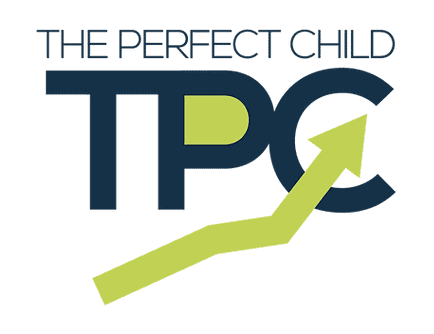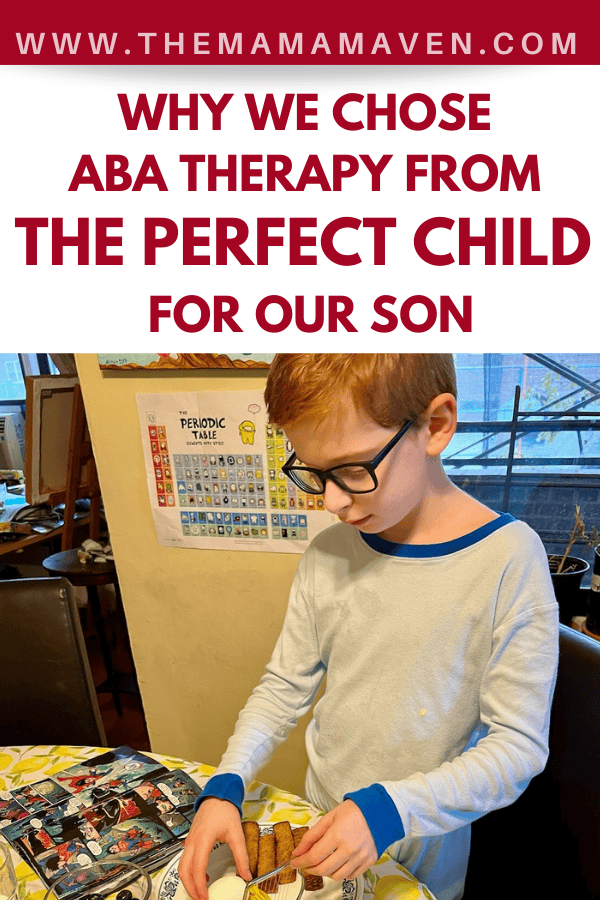This post is written in partnership with The Perfect Child ABA. As always, all opinions are my own.
Having a special needs child is not for the faint of heart. My youngest child, S, is on the autism spectrum as well as having other special needs. S had a lot of trouble with routines, transitions, and schedules at school and at home. We really needed to figure out how we could help him as it was impacting everyone in our family but most importantly our son. When we were offered ABA (Applied Behavior Analysis) therapy services, we researched it carefully and decided that it was for us. We were matched up with The Perfect Child through the school we were at (when we started). Besides the ABA services, we were given parent training (which was fantastic) and we were helped through the process to make things better for our son. I want to let you know why chose ABA therapy from The Perfect Child for our son.

For us, ABA was a life-changing. Our ABA therapist came up with ways to help our child with his everyday life. We were able to do more and more things with him that we weren’t able to do before. There’s lots more I have to say about this, but I wanted to give you some background on why we chose The Perfect Child and why ABA could be an option for your family if you have a child on the autistic spectrum.
I spoke to The Perfect Child’s director/owner, Simcha Bendet, about his agency and for more information about ABA so parents that are interested in working with The Perfect Child have more of an idea of how it can help their child who is on the autism spectrum. If you have any questions, please comment on this post!

TMM refers to us and SB refers to Simcha Bendet.
About ABA and The Perfect Child Agency
TMM: What made you start The Perfect Child?
SB: One of my best friends has a brother with autism. I used to go on trips in camp with them and I used to see how much energy it took out of my friend to take care of his brother. As I got older, I spoke to my father about ways to help other people. I knew from a very young age that running a business was my path. My dad would say,“Imagine you can also create better change at the same time”.
I had a conversation with my friend and dad, and from there, we began advocating for ABA therapy. But advocacy does not pay the bills. Via our connections that we made from advocating, we formed The Perfect Child, which is now an umbrella company for over 30 companies spanning across 11 states.
TMM: What exactly is ABA and how can it help children?
SB: ABA is Applied Behavior Analysis. It is the most effective treatment for people with autism. There exists substantial data that documents the successful outcomes that have been achieved through the implementation of ABA therapy. ABA therapy began to be practiced to help achieve outcomes for individuals diagnosed with autism. Dr. Ivar Loovas was the first practitioner to apply the principles of Applied Behavior Analysis to individuals with autism. He found that through the use of systematic positive reinforcement he was able to teach communication and social language to individuals with autism.
TMM: Why does ABA get a bad rap and what does it really do to help children?
SB: ABA gets a bad rap sometimes for a variety of reasons. They include:
- People are conditioned to fear what they don’t understand.
- Sometimes it is not practiced as it should be, more specifically not all therapists are as good at their craft as others.
- Early practitioners did not know what we know now, that generalization of skills is essential to the learning process, therefore skills that are only exhibited under certain conditions or with a select few, are not useful or purposeful. As time has evolved – greater emphasis has been placed upon the generalization of skills to ensure the transfer of skills.
- ABA – is an applied science that relates to socially significant subjects (people), it is founded upon Skinner’s early discoveries about how the practice of administering positive reinforcement was used to teach animals to perform new behaviors (i.e., tapping a bar in a box to turn on a light.)
TMM: Does a child need to be diagnosed with Autism to get ABA Services? Why or why not?
SB: ABA can be used effectively with individuals diagnosed with many different conditions. Under the Affordable Care Act, only individuals who have a current diagnosis of autism can receive ABA, which is now considered to be a medically necessary service, funded through their insurance company.
TMM: How does a parent get services from your agency?
SB: The process starts with a parent calling our office. We explain what ABA therapy is and take down basic contact information. We proceed to send an intake email – which consists of an intake packet, a request for the front and back of the insurance card, and either a letter with a diagnosis, or preferably a full neuropsychological or psychological evaluation. We then request an authorization for an assessment. Within two days, a BCBA will call to schedule an assessment in your home. They will discuss the goals they feel are important. Together with the parent, a decision will be made about the first six months of therapy.
TMM: When/Where can someone obtain a psychological evaluation?
SB: Most Early Intervention agencies conduct a psychological evaluation and you will be able to obtain one from them. Otherwise, we work with many psychologists who can help.
TMM: Is there a co-pay?
SB: No. At TPC, we believe that families should not have to make the decision between putting food on their table, or appropriate healthcare for a child. We therefore work with third parties and insurance companies to make sure therapy is full paid for, and parent do not need to pay a copay or deductible.
TMM: How does a therapist pair with a child?
SB: Pairing is the process where a therapist establishes himself or herself as a reinforcer to build a positive relationship with a client. (a reinforcer is something a child likes) When pairing, a clinician seeks to associate a neutral stimulus (in this case, you and your words) with something that is already reinforcing to the child. The result of pairing is that the neutral stimulus (again, in this case, it is you) becomes reinforcing to the child via being paired with something that they already find reinforcing.
TMM: What’s a BCBA and how do they fit in in this?
SB: A BCBA is a Board Certified Behavior Analyst. This certification is conferred after achievement of the requirements as asserted by the Behavior Analyst Certification Board. A BCBA is responsible for ensuring that the BT on a case is properly trained, all programs being taught are individualized and appropriate for the needs of the individual client, and that a family is an active participant in therapy, to the extent that they are able to be.
TMM: What’s a typical session like? Or some goals?
SB: There is no such thing as a typical session because all services are individualized. Services occur in home or community settings and the programs run during a session reflect those goals that were delineated by the BCBA and during the assessment and/or reassessment. During a session a client has access to reinforcement on a consistent basis based upon the specific reinforcement schedule the BCBA has prescribed as part of the child’s individual treatment plan.
TMM: What role does parent training have in this?
SB: Parents are key to successful ABA therapy. The parent knows the child better than anyone and therefore, plays an integral role in communicating the needs of his/her child to the BCBA. Goals must reflect the priorities and needs of a family so that the child and family can obtain greater access to reinforcement in the community. This is the true measure of social significance. Parent training will not always look the same in all situations. It is the responsibility of the BCBA and family to meet and design a level of participation that meets the needs of all participants.
TMM: Are ABA therapists solely working at home and will they start going back into schools as COVID-19 lessens?
SB: Most insurance companies do not allow services to happen in a school setting, so I believe it is doubtful. At this time, services occur in home/community settings.
TMM: What do you do if you don’t think a therapist is working well with your child?
SB: CALL US! TEXT US! EMAIL US! We have a team dedicated to client relations. Many parents are afraid to speak up, but then end up being very upset a few months later. We need happy clients! Happy clients are motivated clients! Motivated clients mean client success! We also call families every 4-6 weeks to check-in. Families need to be heard. This also creates a positive experience, and helps ABA therapy get a better reputation.
Today ABA therapy is widely used throughout the world to teach skills which address the communication and social deficits associated with the diagnosis. Additionally, through careful analysis of the determinants of the rigid, stereotypic behaviors which interfere with daily functioning and restrict access to peers in socially significant experiences, ABA allows clinicians and families to reduce interfering behavior.
For more info:
Go to their website at https://www.tpcaba.com, call 1-888-320-3222 or email info@tpcaba.com.
Note: We are not currently working with The Perfect Child because our child started a new school this winter and we transitioned to a therapeutic school environment. We had a fantastic experience with The Perfect Child and really wanted to share why and how it worked for us. We are still close with his therapist and are so grateful for having her in our life. Our hope is that if you are a parent who is interested in starting ABA Therapy, you will consider The Perfect Child. Why We Chose ABA Therapy from The Perfect Child for Our Son





Leave a Reply